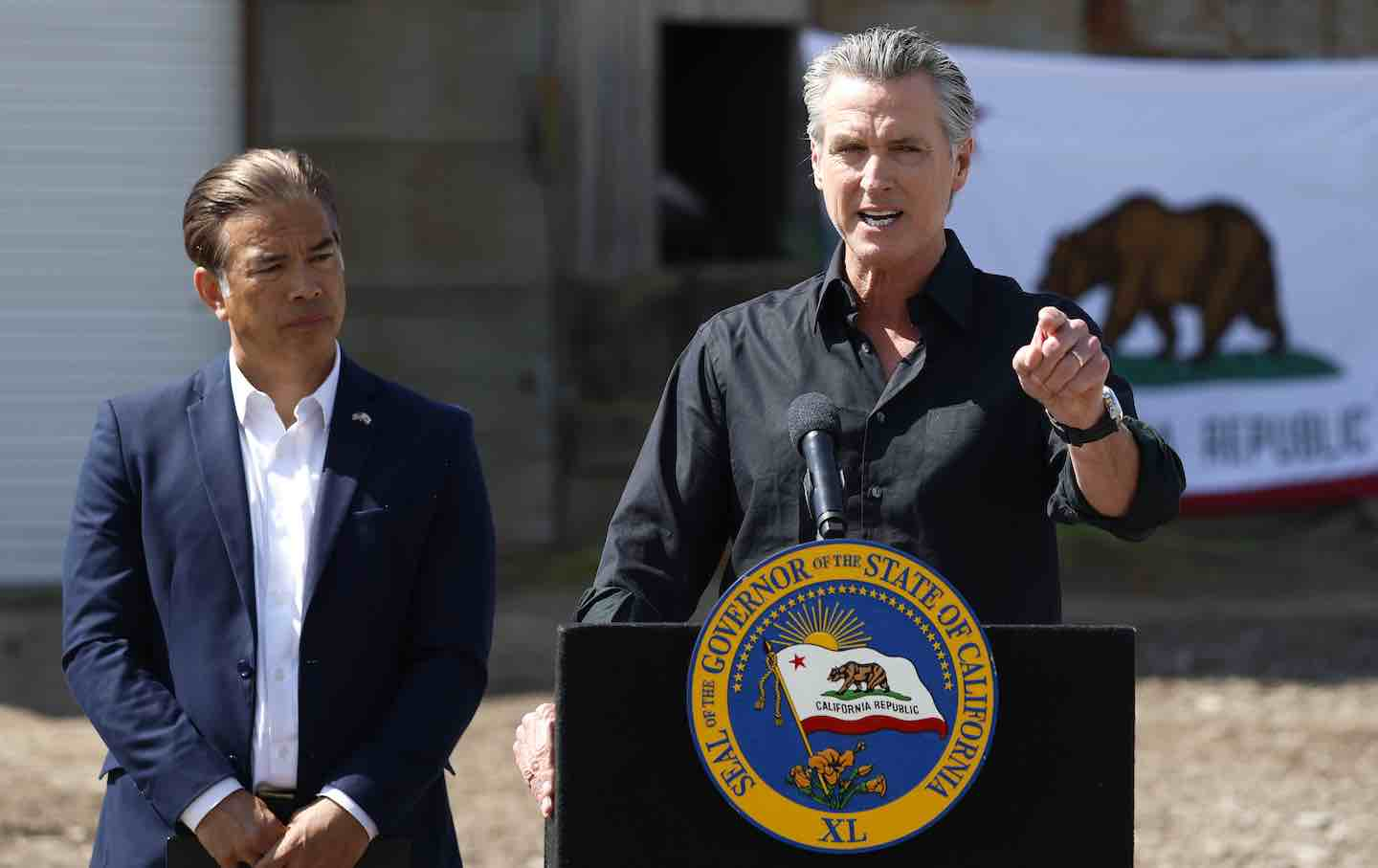Why the “Abundance Agenda” Could Sink the Democratic Party
Big-money donors are using the “abundance agenda” to create a permission structure for Democratic elites to dismiss the populist revival the party so desperately needs.

Abundance liberalism envisions policies that reduce bureaucratic red tape and expand the production of housing and green energy.
(Andriy Onufriyenko / Getty Images)
In a recent piece in The Nation, Ned Resnikoff argued that many advocates of “abundance” on the left offer an analysis of power relations “that is more sophisticated and has more explanatory power” than the one held by some of their critics. He supports this claim with a thoughtful explanation of abundance’s program for increasing housing supply.
But Resnikoff—and, I think, many earnest defenders of the abundance agenda—don’t seem to understand the real reason that this framework has generated such a backlash on the left.
Critics like me don’t fear abundance because we oppose zoning reform. (After all, it was Bernie Sanders who argued in 2020 that “defending exclusionary zoning at the local level in the name of socialism is hokum.”) Our concern is that corporate-aligned interests are using abundance to head off the Democratic Party’s long-delayed and desperately needed return to economic populism.
As a lifelong Democrat and former Democratic state representative, I have never seen the Democratic Party come as close as it is today to embracing FDR’s famous promise to “welcome [the] hatred” of “business and financial monopoly, speculation, reckless banking, [and] war profiteering.”
Americans are angry. They see our economic and political institutions failing them and want leaders who are willing to take the fight to the villains responsible. We all saw the consequences of Kamala Harris’s failure last year to identify these villains; as her deputy campaign manager recently explained, “We are just coming off a campaign cycle in which failing to do this cost us: On our worst issue, inflation, Democrats from the White House on down never convincingly named a villain.… If we can’t show people we believe in something enough to fight for it, we shouldn’t be surprised when they stop believing in us.”
So who are the villains we should be naming? A growing number of Democrats are coalescing around a simple answer to that question: oligarchy. In just the last few weeks, hundreds of thousands of Americans have joined “Fighting Oligarchy” rallies in purple and red districts across the country. And while Sanders and Representative Alexandria Ocasio-Cortez (D-NY) are obviously the preeminent leaders of this movement, they are far from the only Democrats who understand that an economic populist rebrand is our best—and maybe only—chance of defeating Trumpism. Indeed, the recently announced “Monopoly Buster Caucus,” which is dedicated to “fighting corporate power,” is being co-chaired not just by the progressive Representative Pramila Jayapal (D-WA) but also by three frontline, swing-district Democrats: Representatives Chris Deluzio (D-PA), Pat Ryan (D-NY), and Angie Craig (D-MN).
Popular
“swipe left below to view more authors”Swipe →While this populist sentiment catches fire across much of the party’s ideological spectrum, many Democratic elites still oppose any attempts to identify billionaires and corporations as villains. These groups and individuals come from or get paid by these same billionaires and corporations, and they are terrified of the prospect of a populist takeover of a party—their party—that has for decades served as a comfortable partner to oligarchy.
We’ve seen this pushback come in various forms. Senator Elissa Slotkin (D-MI) called for Democrats to stop using the term “oligarchy”—a word she has regularly used to describe Putin’s billionaire allies in Russia—because, according to Slotkin, regular Americans don’t understand the concept. (Recent polling shows that majorities of Democrats and independents can define oligarchy and believe it describes the current situation in the United States.) Matt Bennett, cofounder of the centrist think tank Third Way, similarly complained that “demanding economic populism is its own form of purity test” and argued that Democrats should stop using a “fighting the oligarchs” message.
Read More on “Abundance”:
Groups like Third Way, which are largely funded by billionaires and corporations, have been major boosters of the abundance framework, as have other key pillars of US oligarchy, including crypto, Big Tech, and Big Oil. These interests have a clear vested interest in derailing the growing Democratic turn toward economic populism. And they have found in abundance advocates—like Abundance coauthor Derek Thompson, who recently argued that oligarchy “does a terrible job of describing today’s problems”—a valuable tool for redirecting the anti-establishment rage building within the Democratic base away from themselves and toward a new set of scapegoats: bureaucracy, leftists, and what Thompson and his coauthor Ezra Klein call “everything bagel liberalism.”
This is not me straw-manning or putting words in people’s mouths. Here’s how Thompson described the role he sees abundance playing within the Democratic Party, in an interview alongside Klein on the Lex Fridman Podcast:
On the Democratic side, there is a fight, and it’s happening right now, and our book is trying to win a certain intra-left coalitional fight about defining the future of liberalism in the Democratic Party. So, I’m not of the left. I’m certainly not of the far left…but I do not begrudge the left for fighting, because there’s a fight to be had.…
Now, our book and much of my writing is an attempt to do a little bit of a very specific dance.… We’re in an era right now of anti-institution politics, anti-establishment politics, and Democrats are at risk right now as being seen as the party that always defends institutions, the party that always defends the establishment status quo, and that is an absolute death knell, I think for this century’s angry anti-establishment politics.
So, what we’re trying to do is essentially say, here’s a way to channel the anger that people have at the establishment, but toward our own ends, right? We believe that we have answers on housing and energy and high-quality governance and science and technology, really good answers that are fiercely critical of the status quo in Democrat-led cities and Democrat-led states. We’re trying to be oppositional in a way that’s constructive rather than just destructive.
I find this quote chilling. Here’s one of the leading advocates of abundance saying in plain English that he (1) self-consciously sees their project as battling with the left for the future of the Democratic Party, (2) understands that we’re in a moment of intense anger at the establishment status quo, and (3) believes that the abundance agenda can “channel the anger that people have at the establishment, but toward our own ends,” i.e., redirect the public’s rage away from the parasitism of economic elites and toward the regulatory regimes of state and local Democrats.
This is what anyone who’s been confused by the strength of the abundance backlash needs to understand. Our concern is not that the framework is “a dry, technocratic exercise with no political core,” as Resnikoff put it. Our fear is that this billionaire-backed project is being explicitly used to undermine the kind of populist rebrand necessary to shed Democrats’ reputation as feckless cowards who can’t be trusted to fight for working people—to swap out a villainization of corporate elites that evokes FDR with a demonization of bureaucracy, regulation, and red tape that lends credibility to Elon Musk, who, it’s worth noting, reposted a clip of Klein pitching abundance with the message, “This shows why regulatory overhaul is necessary.”
This isn’t an idle fear. Abundance proponents are extremely influential within the Democratic Party; just this week a group of centrist Democrats launched an Abundance Caucus and Klein briefed Senate Democrats at their annual retreat. That’s particularly concerning given that taking on oligarchy-aligned Democratic elites was already a herculean task. Abundance, and the permission structure it offers Democrats who’d rather not alienate their Big Tech/Big Oil/Big Money donors, could be the margin that pushes a populist renaissance for our party out of reach.
The fight for that renaissance is one we can and must win. But to do so, we have to be forceful about addressing the obstacles in our path. One of these obstacles is the abundance agenda and the well-funded apparatus that has emerged to promote it. When we respond aggressively to abundance—describing how it reifies Trump’s deregulatory messaging, naming conflicts of interest among its backers, pushing back on nonsensical claims that it provides an electorally compelling program—it’s not because we’re overreacting to proposals to make building easier in blue cities and states. It’s because we have an analysis of the role of abundance in today’s Democratic Party that I would argue is “more sophisticated and has more explanatory power” than the one held by many of abundance’s defenders.








